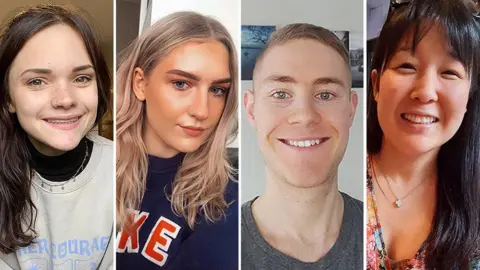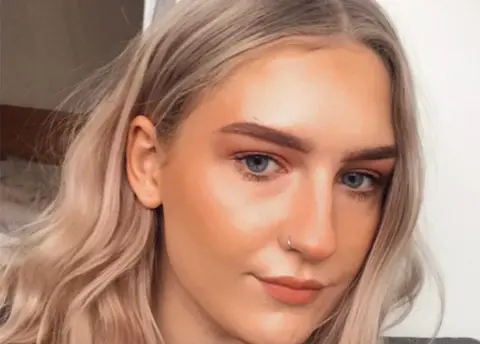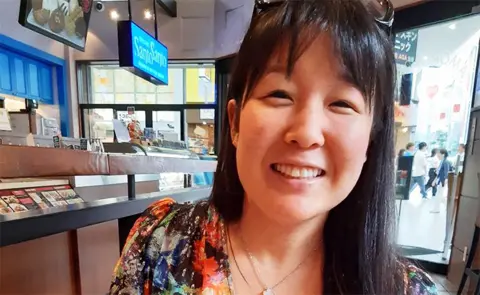Anorexia: 'Difficult' to get proper support in lockdown
 Contributors
Contributors"It's not right that somebody should die from an illness that can be treated."
The news of Nikki Grahame's death hit home for 23-year-old Katie Scott.
"I've read her books and really followed her story. It's just devastating," she tells Radio 1 Newsbeat.
Like Big Brother star Nikki, Katie has experienced anorexia. She's had it for eight years and found it difficult to manage in lockdown over the past year.
Anorexia is an eating disorder and mental health condition where people are of low weight due to limiting how much they eat and drink.
According to the charity Beat, it has the highest mortality rate of any mental illness, with Beat's helpline seeing a 300% increase in people contacting them in the last year.
- If you are affected by the issues in this story, help and support is available via the BBC Action Line and the charity Beat Eating Disorders.
Treatment changes
For Katie, lockdown has been "isolating and a hindrance" to her recovery.
She was attending treatment before the first lockdown, and since then it's all been online.
"It's been quite disjointed, through absolutely no fault of the treatment centres themselves," she says.
"But it's been a difficult time trying to get that kind of support."
 Katie Scott
Katie ScottCara Lisette has also struggled with the treatment change over the past year.
The 30-year-old was diagnosed with anorexia 18 years ago.
Her recovery was delayed in the pandemic, as she went from "having really intensive daily help" at a clinic, with therapy groups and meal support - to everything being done remotely.
"They did an amazing job of trying to make treatment effective and replicate it as much as possible, but it's not the same," she says.
 Cara Lisette
Cara Lisette"I don't think there is a very good substitute for face-to-face."
Doing therapy at home in Hampshire hasn't been easy either.
"I had to work a lot harder at making sure my house didn't feel kind of like a therapy space."
Thinking about food more
Working from home has caused greater thoughts and feelings about food for Georgia Nestor.
The 22-year-old from Warrington has suffered from anorexia since she was 15. But she's reached a place of "learning to live" with the negative thoughts.
"Normally at work I'd go out with colleagues for lunch or after work. But not doing that has made me think about food a lot more."
"Every day it's like, 'what am I having for breakfast? What have I had for lunch and what am I having for tea?'"
Thoughts around food control are negative for her, but she's thankful to her twin sister for supporting her.
"We eat together and make different dishes. So I have someone there who can tell what I'm thinking."
 Georgia Nestor
Georgia NestorAdam Fare started lockdown with a positive mindset, wanting to use what he thought would only be a few months of restrictions as "a springboard for recovery".
For 12 years, the 24-year-old has had anorexia and atypical anorexia - when symptoms may not exactly match everything a doctor checks for to diagnose anorexia.
The past year has been "up and down", he says.
He felt "alone and isolated" and says "there was nobody to be accountable to" for the amount he was eating and exercising.
 Adam Fare
Adam FareHe moved from Birmingham to Milton Keynes, and became very close to being hospitalised.
But after "a crisis point", he prefers to focus on the positives.
"There's less pressure to eat in front of others and hearing comments to do with dieting and body shaming which can be triggering."
 Hannah
HannahHannah's 32 and first experienced bulimia and then anorexia in her mid-20s, but has found recovery in the last few years.
But old behaviours returned in the first part of lockdown.
"Eating disorders manifest around rituals for me centres around numbers - be it running, weight and calories."
She has thrown away scales and no longer weighs herself, but last year had a little slip.
"I marched into my GP to weigh myself. It was abnormal behaviour, and I felt embarrassed but found myself doing it anyway."
She feels fortunate to have not had a relapse and says while the illness "never truly goes away", she has a support system to help, including regularly attending a support group.
A return to socialising
Katie has spent most of lockdown desperate for everything to reopen and return to normality.
"With my eating disorder, I really need that kind of motivation of seeing my friends," she says.
But with restrictions being eased and greater freedoms in sight, she's also "unexpectedly anxious".
"I've gotten used to being in lockdown and adapted to this new normal. I'll need to take it one step at a time and lean on support."
Adam is looking forward to the easing because it gives him the chance to be more accountable to others.
"I've got some really good colleagues who help and will be able to see my family more."
He's also joined a football club to help with routine and social interaction.
 Cara Lisette
Cara LisetteWhile Cara is excited, she's also cautious about socialising over food.
"I haven't had to expose myself to going out for dinner and drinks at all over the last year so I'm quite anxious about that."
Both Georgia and Hannah are looking forward to seeing friends and getting back into the swing of a social life, challenging any feelings of anxiety.
"It's definitely a big pressure, but in the long run, it's going to be for the better," Georgia says.
"I'm excited to do normal stuff like meeting people, because it's been a hard time, especially for people with mental health issues," Hannah adds.

Tom Quinn, the director of external affairs at Beat wants increased funding and staff numbers to help deal with eating disorders.
"The science is clear that the sooner you get help for an eating disorder, the more likely you are to make a full recovery."
And with things opening up, Tom says people shouldn't put too much pressure on themselves.
"Some people will find that harder than others. But it will require a period of adjustment."
"Our helpline is available every day for people finding it difficult."


